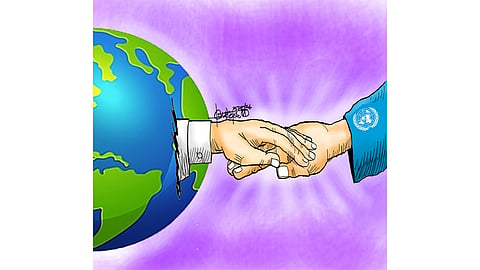
- NEWS
- the EDIT
- COMMENTARY
- BUSINESS
- LIFE
- SHOW
- ACTION
- GLOBAL GOALS
- SNAPS
- DYARYO TIRADA
- MORE

Over 140 countries at United Nation headquarters in New York on 22 September adopted a ground-breaking Pact for the Future containing 56 recommendations for regional, national and international action covering a wide range of pressing global challenges.
The Pact, along with its annexes — Global Digital Compact and a Declaration on Future Generations — was signed during a two-day Summit of the Future hosted by the UN General Assembly before it started its initial high-level UNGA meeting on 24 September.
Despite arguments by Russia’s Deputy Foreign Affairs Minister Sergev Vershinin that the UN should not have more power to intervene in matters within specific national jurisdictions, the Pact was adopted by a landslide, with only seven nations against and 15 abstentions.
The adoption of the Pact was the result of a long arduous process that started in early 2024 when UN Secretary-General Antonio Guterres sounded an alarm to the UNGA about the survival of humanity amid critical global challenges “moving faster that we can solve them in a rapidly changing world.”
And so the Summit, called “crucial” with humankind confronting multiple severe tests — in the Middle East; of Lebanon becoming “another Gaza;” the extreme weather battering the planet with alarming frequency; trade protectionism sparking a backlash against globalization; emerging technologies creating a crisis for which there are no existing governance experiences to draw on — came to pass last Sunday.
It was not only an important assessment of the existing global governance system, but a collective reflection of where the world was headed.
After arduous negotiations, a 42-page document was forged, unlocking the door for nations to take collective action to improve the lives of some eight billion people around the world.
In the Pact were 56 pledges to action aimed at “laying the foundations for a sustainable, just and peaceful global order for all peoples and nations.”
Its key deliverables included the most progressive and concrete commitment to Security Council reform since the 1960s, with plans to improve its representativeness and effectiveness; the first multilateral recommitment to nuclear disarmament in over a decade, with a clear commitment to the goal of totally eliminating nuclear weapons even as it took steps to avoid weaponizing new technologies; and affirming that the laws of war should apply to many of these new technologies.
The Pact is designed to turbocharge the implementation of the Sustainable Development Goals and reform the international financial architecture to better represent and serve developing countries, including giving the latter greater say in how decisions are made at international financial institutions.
Also agreed on was the mobilization of more financing from multilateral development banks to help developing countries meet their needs; reviewing the sovereign debt system, with the IMF, G20 and the UN working together to ensure that developing countries can borrow sustainably to invest in their future; strengthening the global financial safety net to protect the poorest nations against financial and economic shocks through concrete action by the IMF and UN member states; as well as accelerating moves to deliver finance to help countries adapt to climate change and invest in renewable energy.
A milestone likewise was the Global Digital Compact. Annexed to the Pact, it is the first comprehensive global framework for digital cooperation and AI governance, and also the first global commitment to data governance, placing it on the UN agenda and requiring member countries to take concrete actions by 2030. Pledges of over $1.05 billion were made to advance digital inclusion.
The Pact was adopted at the two-day Summit that was held at a time when humankind stands at a crossroads, facing a critically urgent need to forge consensus.
It is not a legally binding document, but it reflects hard-won common consent in an increasingly diverse international community, even as it bolsters the status of the UN that, no matter the colossal challenges the world body faces on its own, continues to be this international entity that plays a consequential role in global affairs.
